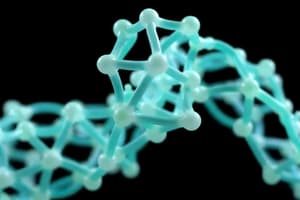Podcast
Questions and Answers
What is polymer crystallinity and what factors affect Tg?
What is polymer crystallinity and what factors affect Tg?
Polymer crystallinity refers to the degree of structural order in a polymer. Factors affecting Tg (glass transition temperature) include chain flexibility, molecular weight, and presence of plasticizers.
What is a polymer?
What is a polymer?
A polymer is a material composed of very large molecules formed by joining together thousands of small molecular units by chemical bonds.
What is the molecular weight of polymers?
What is the molecular weight of polymers?
The molecular weight of polymers can be measured by average molecular weight (weight average and number average) and Polydispersity Index.
What are some examples of commercially important polymers?
What are some examples of commercially important polymers?
What are conducting polymers and how do they conduct?
What are conducting polymers and how do they conduct?
What are some pre-requisites for studying polymers?
What are some pre-requisites for studying polymers?
What is meant by the molecular weight of polymers?
What is meant by the molecular weight of polymers?
What is polymer crystallinity and what factors affect the glass transition temperature (Tg)?
What is polymer crystallinity and what factors affect the glass transition temperature (Tg)?
What are some commercially important polymers mentioned in the text?
What are some commercially important polymers mentioned in the text?
What is the mechanism of conduction in conducting polymers and can you provide examples and applications?
What is the mechanism of conduction in conducting polymers and can you provide examples and applications?
What is the definition of a polymer?
What is the definition of a polymer?
What is the molecular weight of polymers?
What is the molecular weight of polymers?
What is polymer crystallinity and what factors affect Tg?
What is polymer crystallinity and what factors affect Tg?
What are conducting polymers and how do they conduct?
What are conducting polymers and how do they conduct?
What are some examples of commercially important polymers?
What are some examples of commercially important polymers?
Flashcards are hidden until you start studying




